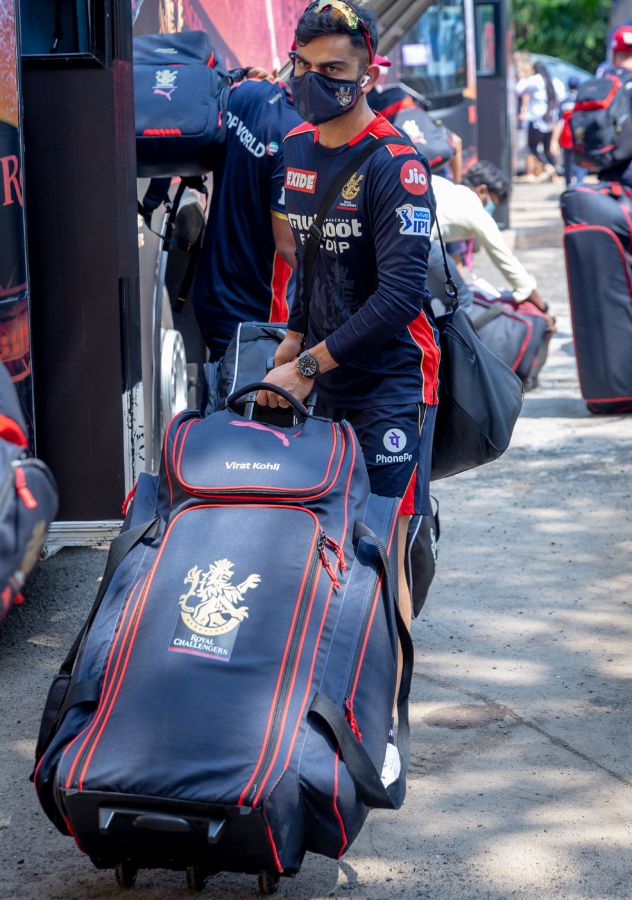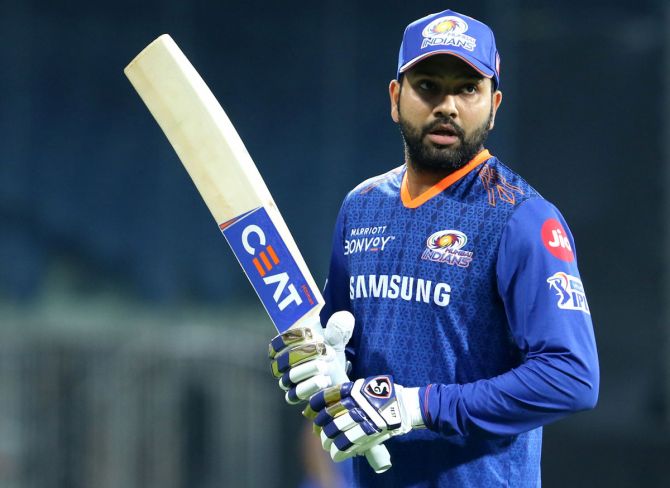'I think the bio-bubble will teach athletes that they are responsible for their own happiness, that they are responsible for their own mental strength, that running away is not the long-term solution.'

Life of a professional cricketer isn't easy and the COVID-19 pandemic has made things all the more difficult as movement off the field is strictly monitored, says mental conditioning coach Anand Chulani, who is working with several players in IPL 2021.
Chulani says adjusting to the protocols of a bio-bubble life isn't easy for a cricketer and this is where the role of a mental conditioning coach becomes very important.
While his association with England and Rajasthan Royals batsman Jos Buttler is well documented, Anand is also working with cricketers in three IPL teams at present -- Rajasthan Royals, Delhi Capitals and Kolkata Knight Riders.
"I speak to a lot of guys. I mean, there's different levels. Some guys I speak to formally, in the sense of I'm coaching them formally. You know, a lot of these guys are friends. So I speak to them informally as well. Unfortunately, some of the Indian boys don't feel like they want to share it. Working with a couple of prominent ones that are in the Indian team, I do realise that, you know, there's still a sense of not wanting to let the name out when it comes to the Indian society," Anand told ANI
Anand feels there is still a lot of stigma attached to discussing mental health in India and that is what keeps Indian sportspersons away from talking about their experiences with mental coaches.
"I think, you know, to me, it's about honesty and humility and also stigma. I think a lot of Indian cricketers are very humble. And I think they do share a lot of praise, you know, but they share it with their coaches, they share with their trainers. What I think unfortunately, people look at the medical side of it, as always, if I share, there's a problem with you know, I'm not strong.
"Whereas to me, that's ridiculous because everyone's strong. In the same way we conditioned our body, we initiate our minds. So when a person gets help with a physical trainer, it doesn't mean they're not strong. It just means they want someone to help them condition muscles. In the same way, you know, if someone shares that I gave them help mentally, it doesn't mean that they are weak, it just means someone helped them condition their mental muscles," he explained.
Asked about the types of queries that come to him from the cricketers, Anand said: "Sure, I can tell you I worked in the IPL now for a couple of years. I'm working with a few players from Kolkata, Delhi, a few players from Rajasthan. The kind of questions that have come to me. Well, it depends. In my couple of years working with the IPL, I get different cases. So I've had, a lot of times a player will come to me, if they're not feeling good, they're mentally stressed. They're feeling pressure, or they don't feel confident.
"There's a whole bunch of boys that just come to me for I guess life lessons, if nothing else, you know, people forget these guys are like in their 20s, late 20s. You know, I've helped boys in the IPL with their relationships, you know, with their girlfriends. I've helped them, you know, handle family pressures at home. You know, I help them, you know, deal with insecurities they even have about other teammates.
"Yes, I'm a mental conditioning coach. And yes, I work with their mind, but I'm actually working with who they are fully. If you are a self-doubting person off the field, you are more than likely to be under pressure on the field, you'll be self-doubting."
So what is the key to succeed then? Anand says self-doubt is normal, but one must overcome it to succeed at the top level. He also feels the avenues to switch off have decreased in the bubble life and that makes it more important to be mentally strong.
"It's like every athlete has self-doubt just as every human being has self-doubt. But before in the IPL, they would have parties or they would have social events or they would go out or they would find other ways to release that pressure, or stress or overthinking. Now, what's happened is they've got less, you know, avenues to release that tension, or to distract themselves from their thoughts. So all the reason why, in my opinion, they have to be mentally fit.
"You know, I remember working with some English players at the bio-bubble last summer. I remember that the bedroom that these guys were in, overlooked the field. So you leave the bigger field, you come to your bedroom, but you have no release from the cricket field.
"Yes, franchises are giving them you know, pool tables and table tennis tables and video games and all these things to take them out of focus. And those things definitely help. But to me, those are more helpful for team bonding. To me, the only person who is connected to your thoughts is you. If you are a prisoner of your own thoughts, it doesn't matter how many things you're in. That's the bubble you live in.
"To me the real problem, the real issue is not the bio-bubble. The real issue is the mental bubble. And what bubble do you keep yourself at? Is the bubble positive, encouraging, supportive, or is the bubble surrounding your thoughts a prison? I think the bio-bubble will teach athletes that they are responsible for their own happiness, that they are responsible for their own mental strength, that running away is not the long-term solution.
Facing it, getting through it, having the power over your mind, directing your mind is the solution," he explained.

Differentiating Indian cricketers and the pressure they have to face from the ones faced by cricketers from other countries, Anand said: "There's pressure from family, there's pressure from society, this pressure from a community, I think, in many ways Indian players carry, I wouldn't say more pressure, but I would say, you know, a different set of expectations.
"English players, and also new players I work with, they are passionate playing for the country, you know, they feel the pressure of, you know, representing their country and all those factors. But I think the difference is, I find that, you know, from what I can see, the life that they live in those countries, allows them more opportunity for balance.
"You know, they can lose themselves and go away, and no one will bother them. When I'm in London, I've been to places like that I've met these guys, you know, I can go and have a coffee with them. And no one will come up to them and ask them a question. I go with one of my Indian boys in India, in Mumbai, oh my god... So I think we as a cricketing nation, you know, like, these are human beings. They're not gods, the 20-year-old men.
"Every Indian man and woman is a champion. So to me, we as a country tend to put people on a pedestal. And in doing that we do a disservice to them, and to ourselves. I think there's got to be a shift in that. Fans or followers need to just give the cricketers a little more space, treat them like human beings, not Gods."
Anand says fear of failure is something that sportsperson face across the board and that can be best addressed when one is mentally strong.
"You know, I think one commonality to every cricketer I've worked with, or met is fear of failure. I think being secure in yourself is the key thing. You know, why is it that the Indians that we as a country, don't win so many Olympics gold medals, it's not because of lack of talent. It's not because of lack of skill. It's a feeling of mental, of being mentally strong, and feeling secure in ourselves on a world stage. You know, that's to me, where we need to go to next as a nation and as athletes, and we do we have the ability.
"So to me, the fact that people look at mental strengthening as a weakness is really because it's the one difference that can take us to, you know, dominate in every sport, not just cricket," he said.












 © 2025
© 2025